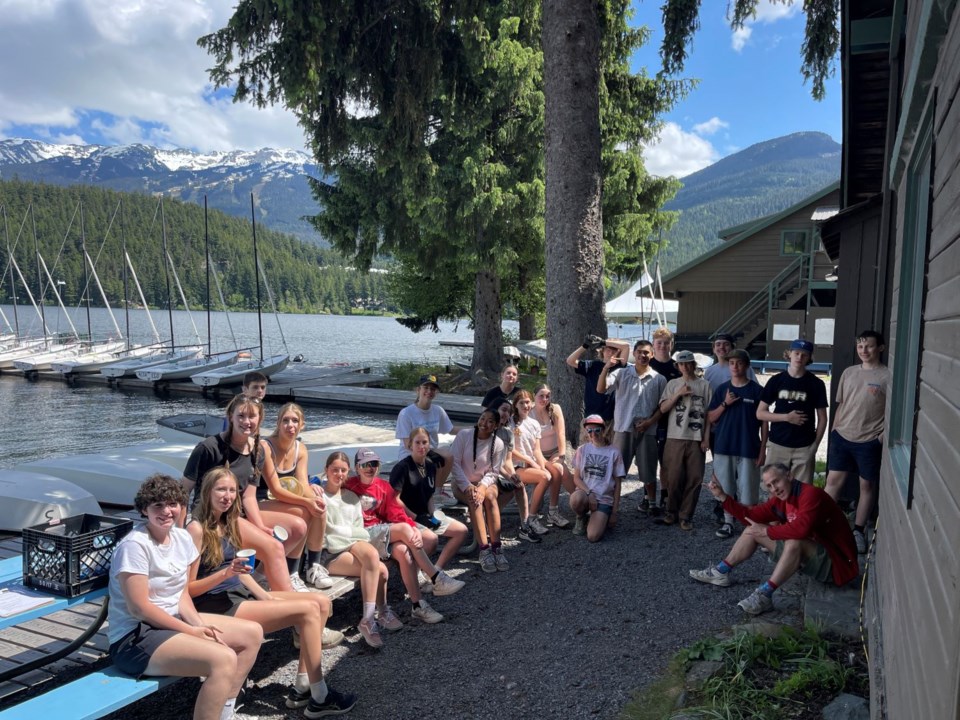Two Grade 9 classes from Whistler Secondary School (WSS) rolled up their sleeves earlier in June and—under the supervision of phys-ed teacher Peter Train—helped the Whistler Sailing Association (WSA) create a new outdoor classroom.
By clearing out invasive plants, hauling out debris and levelling ground, the students transformed a section of the WSA waterfront. Now the previously underutilized area may accommodate instructors as they teach sailing theory, weather, safety, and environmental awareness by the water without needing improvised setups.
In return for their hard work, WSA general manager Francois Hebert guided the youngsters through beginner sailing lessons where they learned how to steer a boat, adjust sails, read wind direction and keep themselves safe. A capsize drill, where kids intentionally tipped their craft to practice recovering it, formed a key part of the experience.
"[The outdoor classroom] adds tremendous value to our programming, especially for schools and larger youth groups. As our programs continue to grow, having this dedicated outdoor classroom also gives us much-needed additional space to support that expansion," Hebert said. "The sailing centre belongs to the community, as it is located on Resort Municipality of Whistler property. Whistler Sailing is a non-profit organization dedicated to making sailing accessible and affordable for people of all ages and backgrounds.
"Our focus is on community access, reducing barriers to entry, and providing inclusive programs that connect youth and families with the water in a fun and welcoming environment."
WSA members originally envisioned building a deck in the space they wanted to develop, but the Resort Municipality of Whistler (RMOW) did not support that idea. Meanwhile, the idea of full-day sailing field trips with WSS fell through due to a lack of funding.
Hebert and Train decided on a novel solution: time on the water in exchange for student help in landscaping the site—which cannot be accessed by machinery like tractors or excavators due to the presence of a nearby railroad track.
'Stone by stone, with purpose'
The collaboration materialized "with great enthusiasm," according to Hebert. A trio of WSA staff and a volunteer helped direct the students, while board member Mick Gannon planned the new site's layout and brought in necessary tools like rakes, shovels, saws and wheelbarrows. Gannon's laser level coordinated efforts by both classes, ensuring the area had a two-per-cent slope towards the lake for proper drainage.
Train also played a central role in scheduling, supervising his pupils and making sure the project aligned with WSS educational goals.
"WSA has had a long-term relationship with Peter. He loved the idea of the community project I suggested and he was very supportive from the start," Hebert remarked. "His calm presence, steady guidance, and way of keeping students engaged helped everything run smoothly. He really connected the dots between the idea and making it happen. He even gave us a crash course in proper rock wall building, complete with classic U.K. technique: think 'stone by stone with purpose.' He was right there with us, hands-on, getting dirt under his nails and helping every step of the way."
Each class encompassed 25 students, who combined for a total of 100 volunteer hours (two per person). Many had never been on a sailboat before, but responded favourably to instruction. As the group's confidence increased, some expressed interest in taking additional lessons or summer programming.
"The student response was amazing, which came as a bit of a relief. I wasn’t sure how interested they’d be in the physical work or whether they’d connect with the experience at all … but they jumped in with energy, took pride in the project and really embraced the whole process," Hebert recalled. "I think some of them enjoyed hauling gravel and moving dirt just as much as, if not more than, the sailing itself.
"There was something incredibly rewarding about seeing that much progress happen so quickly, just from everyone working together. It was a big change from their usual classroom routine and they totally got into it. At one point, kids were literally running with wheelbarrows like it was a race. The energy was contagious."
WSA board members and volunteers raised more than $13,000 alongside their community to facilitate the outdoor classroom undertaking. Remaining funds will go towards installing whiteboards for instruction, building a sail storage shed for improved organization and adding a shade sail to provide shelter. Hebert expects the classroom to be ready in the coming weeks, just as WSA's youth summer camps launch.
The 2023 ILCA7 Laser Master Sailboat champ sees a great deal of value in giving Whistler's teenagers a chance to acquire new skills and mould their community. He hopes to begin an annual tradition of work projects with WSS going forward.




